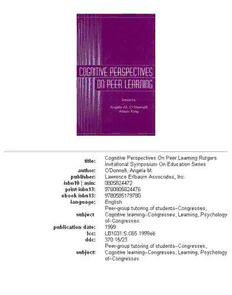Download Cognitive perspectives on peer learning PDF Free - Full Version
Download Cognitive perspectives on peer learning by Angela M. O'Donnell, Alison King in PDF format completely FREE. No registration required, no payment needed. Get instant access to this valuable resource on PDFdrive.to!
About Cognitive perspectives on peer learning
The contribution of this volume to the literature on peer learning is its focus on approaches that reflect a common concern with cognitive processes based in developmental, information processing, or more generally, constructivist perspectives on peer learning. Although the clear importance of the social context of peer learning is not ignored, the volume's emphasis is on the cognitive growth that occurs within the learning environment. Any discussion of peer learning involves consideration of who is learning, how the role of peers with whom one works can be conceptualized, what it is that peers learn together, what changes as a result of the interaction, and how we can know what occurs in groups or what has been learned. The chapters in this book speak to these questions. The key question underlying many of these others is why we should worry about the intricacies of peer interaction. Both the practical and theoretical reasons for doing so are delineated. The developmental theory presented in the Introduction lays the foundation for the later descriptions of specific techniques, though many of the techniques reflect a range of other influences as well. Part I presents the implications of the work of two major theorists in cognitive development, Piaget (Ch. 1) and Vygotsky (Ch. 2). In Part II, six chapters describe a variety of peer learning techniques or models of collaboration, many of which are influenced by the work of Piaget and Vygotsky. The chapters in Part III consider the role of the teacher and the skills needed when using peer learning as an instructional strategy. The Conclusion points to areas in which further research is needed. This volume is based on original papers presented by the contributing authors in November 1996 at the Rutgers Invitational Symposium on Education on Cognitive Skills and Learning With Peers.
Detailed Information
| Author: | Angela M. O'Donnell, Alison King |
|---|---|
| Publication Year: | 1999 |
| ISBN: | 9780805824476 |
| Language: | English |
| File Size: | 1.235 |
| Format: | |
| Price: | FREE |
Safe & Secure Download - No registration required
Why Choose PDFdrive for Your Free Cognitive perspectives on peer learning Download?
- 100% Free: No hidden fees or subscriptions required for one book every day.
- No Registration: Immediate access is available without creating accounts for one book every day.
- Safe and Secure: Clean downloads without malware or viruses
- Multiple Formats: PDF, MOBI, Mpub,... optimized for all devices
- Educational Resource: Supporting knowledge sharing and learning
Frequently Asked Questions
Is it really free to download Cognitive perspectives on peer learning PDF?
Yes, on https://PDFdrive.to you can download Cognitive perspectives on peer learning by Angela M. O'Donnell, Alison King completely free. We don't require any payment, subscription, or registration to access this PDF file. For 3 books every day.
How can I read Cognitive perspectives on peer learning on my mobile device?
After downloading Cognitive perspectives on peer learning PDF, you can open it with any PDF reader app on your phone or tablet. We recommend using Adobe Acrobat Reader, Apple Books, or Google Play Books for the best reading experience.
Is this the full version of Cognitive perspectives on peer learning?
Yes, this is the complete PDF version of Cognitive perspectives on peer learning by Angela M. O'Donnell, Alison King. You will be able to read the entire content as in the printed version without missing any pages.
Is it legal to download Cognitive perspectives on peer learning PDF for free?
https://PDFdrive.to provides links to free educational resources available online. We do not store any files on our servers. Please be aware of copyright laws in your country before downloading.
The materials shared are intended for research, educational, and personal use in accordance with fair use principles.

